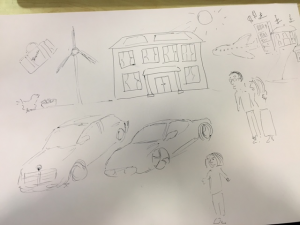‘Talk and draw’ is a relatively new qualitative data collection method in management research. Dr Julie Robson and Samreen Ashraf from the Business School (FOM) have used this method in four separate studies, most recently in their project ‘Perceptions and use of pension savings: the case of South Asian consumers living in the UK’ funded by the Academy of Marketing.
Using this technique, interviewees were asked to draw a picture in advance of an interview. The picture was to represent what comes to mind when the interviewee thinks about their pension and retirement. Interviewees were asked to talk about their picture and what the images meant to them during the interview. While this method was advantageous for this research, helping interviewees to think more broadly about the topic and surface thoughts that may not have initially come to mind in an interview, it also brought some challenges which we thought we would share to help other researchers thinking about using this technique.
- The need to produce a masterpiece
Initially prospective interviewees expressed concern that they were not very good at drawing. Some were reluctant to take part thinking that the quality of the drawing was important. It was therefore necessary to reassure interviewees up-front that we were interested in the content of the drawing and what the images represent rather than the production of a masterpiece.
- Producing the drawing before the interview
For most people drawing is an enjoyable activity, but it does take time. Some interviewees wanted to delay the production of the drawing to the interview itself. It was important to contact interviewees prior to the interview to remind them of the need to produce their drawing in advance rather than use the time allocated for the interview.
- A final check for any additions or changes to the diagram
During the interview, interviewees reflected on their drawing and the meaning of the images they have produced. During this discussion new thoughts emerged and it therefore became evident that there was a need to check at the end of the interview if the respondent wanted to add or change anything in their diagram and ask why?
If you have used the talk and draw method or are thinking about doing so we would be very interested to hear about your experience or plans. Please contact Julie Robson (jrobson@bournmeouth.ac.uk) or Samreen Ashraf (sashraf@bournemouth.ac.uk)












 SPROUT: From Sustainable Research to Sustainable Research Lives
SPROUT: From Sustainable Research to Sustainable Research Lives BRIAN upgrade and new look
BRIAN upgrade and new look Seeing the fruits of your labour in Bangladesh
Seeing the fruits of your labour in Bangladesh Exploring Embodied Research: Body Map Storytelling Workshop & Research Seminar
Exploring Embodied Research: Body Map Storytelling Workshop & Research Seminar Marking a Milestone: The Swash Channel Wreck Book Launch
Marking a Milestone: The Swash Channel Wreck Book Launch ECR Funding Open Call: Research Culture & Community Grant – Application Deadline Friday 12 December
ECR Funding Open Call: Research Culture & Community Grant – Application Deadline Friday 12 December MSCA Postdoctoral Fellowships 2025 Call
MSCA Postdoctoral Fellowships 2025 Call ERC Advanced Grant 2025 Webinar
ERC Advanced Grant 2025 Webinar Update on UKRO services
Update on UKRO services European research project exploring use of ‘virtual twins’ to better manage metabolic associated fatty liver disease
European research project exploring use of ‘virtual twins’ to better manage metabolic associated fatty liver disease